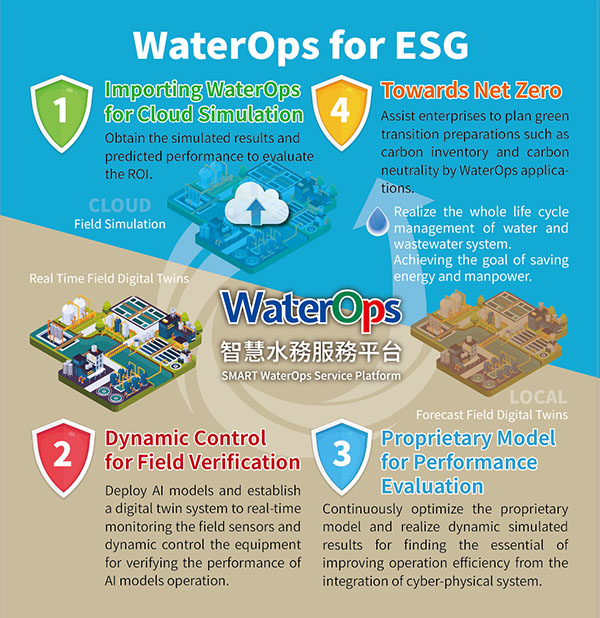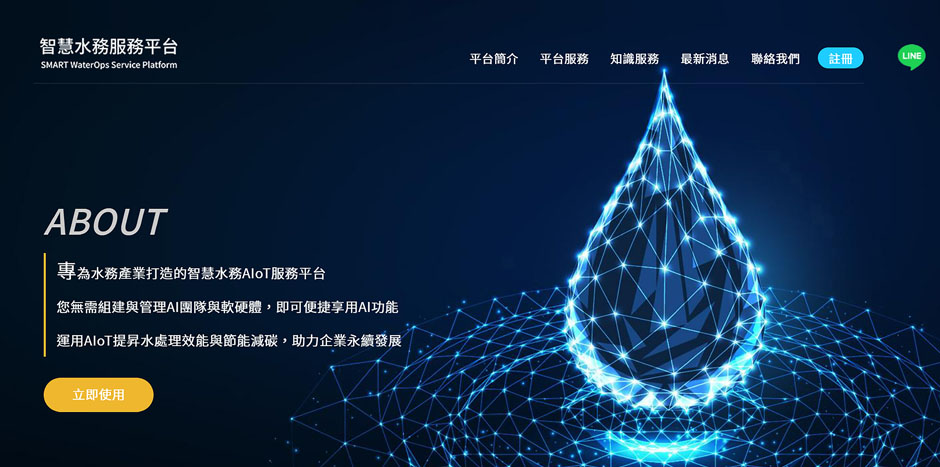 Show Topic
Show Topic
Artificial Intelligence (AI), Machine Learning (ML), Deep Learning (DL), IoT, and AIoT…… How will technological revolution of the next generation impact water resource industry?
GSD Enviro Tech has foreseen the huge potential of AIoT market. That's why Smart Water Promotion Team was established early in 2015. The team has focused on solving problems of water purification, wastewater treatment, sludge treatment, and river water purification. The team offers total solution services, including technological support, equipment maintenance, intelligent monitoring and control system and energy saving plans to users.
In 2018, GSD further addressed 2 strategies of equipment empowerment and AIoT process control. Equipment empowerment centers on the IoT of separate equipment such as pump and blower. An effective management and warning system can significantly lower the cost for maintenance and consequently extend the life of equipment. AIoT process control highlights intelligentization of monitoring and control in treatment processes of water & wastewater system through core technology of big data analysis and edge computing. Taking the biological and chemical process AI models which GSD developed in 2019 as an example, operational performance is improved effectively for the key units of sludge settling, biological activity, aeration and etc.
According to Ph.D. Bo-Chuan Cho, GSD's Chief Technology Officer (CTO), besides AI professionals, GSD smart water resource team also has data engineers, information scientists, and environmental engineering experts as team members. In less than two years, the team completed AI models of intelligent management and control for the wastewater treatment system. Later the team tested these models in some field sites and modified them. Now they are put in use officially.
 GSD Digital Twin is a digital version of virtual models which are duplicated from real-time data of equipment or system at actual site which can be monitored, simulated and forecasted.
GSD Digital Twin is a digital version of virtual models which are duplicated from real-time data of equipment or system at actual site which can be monitored, simulated and forecasted.
In 2021, GSD completed development of SaaS platform for ML/DL/AI and launched the digital twin technology for wastewater treatment plants on WaterOps. The organization provides services to consulting companies as designers of the wastewater treatment plants and engineering companies, O&M companies, wastewater treatment and collecting companies, government agencies and academic institutions, equipment manufacturers, and equipment inspection maintenance companies. Users can perform their virtual analysis on these AI models provided by the platform, with no need to set up their own AI team.
In other words, user can put in basic water and wastewater operational information into WaterOps to initiate a virtual system. Through these AI models, a simulation is conducted to produce the optimal results. User can then build a physical system and AI management center according to the virtual models and improve on the original plan with data collected by the monitoring system continuously. The results will then be reported back to the virtual system which will upgrade and optimize the existing models. With mutual complement of actual and virtual reality of the digital twin, possible trial and error will be minimized in daily operation and project pre-analysis.
MLOps real-time computing and AI control make it possible for the digital twin to respond parameters caused by dynamic flow of wastewater, different wastewater quality and environmental variations. Being modeled for highly adaptable and flexible ANN (artificial neural network) computing, the digital twin can do various jobs, such as real time monitoring, remote control, performance evaluation, water quality prediction, pollution prevention, and active warning, etc.
CTO Ph.D. Cho says most of the wastewater treatment plants in Taiwan are about to retire. No matter whether to build a brand new one or update the existing one partially step by step, WaterOps will manage the plant throughout its whole life circle effectively. In recent years, UN's SDGs have highlighted the importance of recycling and reuse of water resource. The application of the digital twin technology can improve water reclamation efficiency and consume less energy. It will also extend the life cycle of plants. This is a remarkable advantage for circular economy and ESG.
Current smart water management applications all over the world mostly focus on IoT building, in which digital information is collected and unified. There are very few cases like GSD WaterOps which uses AI models to predict, improve or manage water resources. This coming TIWW, GSD will show to the world for the first time how WaterOps set up at the wastewater treatment plant in biotechnology park and water resources recycling center work. GSD will also publish successional results and related findings on international journals and forum papers in the future. Hopefully this will push the water resource industry into the new era of smart water resource management.
 Oxidation Ditch and A2O units of the water treatment plant planned by GSD which is located at a biotechnology park are incorporated into the intelligent control system. Through intelligent control over precision aeration at aerobic tank, the system ensures water quality and energy saving efficiency.
Oxidation Ditch and A2O units of the water treatment plant planned by GSD which is located at a biotechnology park are incorporated into the intelligent control system. Through intelligent control over precision aeration at aerobic tank, the system ensures water quality and energy saving efficiency.GSD ecosystem
Booth: A0333





